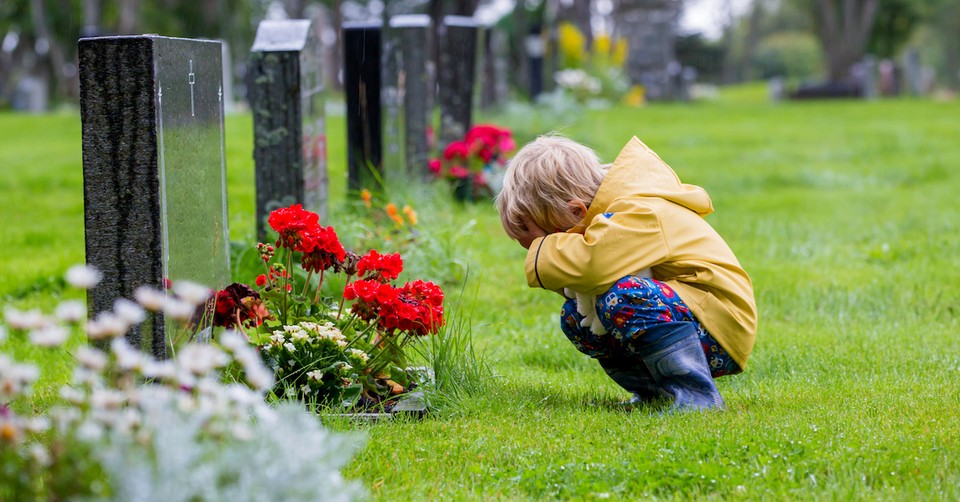Childhood Grief and 6 Ways to Help Your Kids Through It

There are moments in our lives when time seems to stand still. The world stops turning, and you look around, only to see that everything you hold dear begins slowly slipping from your hands, becoming completely out of reach. It is at that exact moment; you realize the fragile nature of this life.
I remember the day my world stopped turning, just like it was yesterday. The doctors looked my dad, sister, and me right in the eyes and told us my mom would likely not survive through the night. I am pretty sure those specialized M.D.s were used to being met with dumbfounded and emotionless stares, but they had no idea how immediately resentful I became.
Their words not only fell upon already emotional hearts, but they just didn’t compute. We couldn’t understand how a relatively healthy woman who walked into the hospital a few hours ago was now lying lifeless in a hospital bed. There was no way this was her fate. There had to be a mistake!
Our family needed her; she was the bedrock. She was my dad’s better half (his words, not mine). She was my sister’s sidekick, my daughter’s biggest fan, and my true north. I needed my mom. I needed her wisdom and advice. Her wit and understanding. Her enduring encouragement. I needed her to tell me how to be a good mom, how to laugh to keep from crying, and how to find joy in the simple everyday moments. I needed my mom!
We desperately prayed for a miracle. But that miracle didn’t happen, at least not this side of heaven.
Once I was able to push past the confusion, a flood of thoughts flooded my mind. How was I going to be there for my dad? How would an absent mother change the relationship with my sister? How could I be the wife my husband needed? And most gut-wrenching of all was the thought of how this would impact my daughters. Their beloved Mimi was gone – in an instant.
It didn’t seem fair. My mind couldn’t fathom the fact that my mom would no longer be here, and my heart wrestled with emotions that quite frankly frightened me. I had no idea how we were going to survive this! And to be quite honest with you, there were murky moments when I didn’t want to. This is the image of adult grief—the messy and unfiltered version.
Childhood Grief Is a Bit Different
But, as a parent that is grieving, there is also another vastly different side of grief. The side of grief that my children carried. While we have lost several people in our family, the grief that flowed from the loss of their grandmother was filled with many unexpected highs and lows.
What I have learned on the course of this journey is that our children process loss differently, and it may manifest intermittently and sporadically. Their feelings may flare up one minute or seem suppressed the next. In other words, their reactions can lead to a springboard of responses, causing tension or apprehension on how to help them cope.
I had three daughters of various ages when my mom slipped from this world and into the arms of her Savior. My oldest was fifteen, my middle turned 13 on the day she passed, and my youngest was six. Each of them presented grief differently.
Walking into the unknown is indeed painful, but it can also be filled with little pockets of promises that God whispers to us in our time of sorrow. If you are wading through the deep waters of grief and trying to learn how to love and guide your child through it, I’d like to extend my heartfelt condolences. I do understand that the journey you are on seems daunting. But, if I may, I’d like to give you hope in knowing that you won’t always feel this jaded, uncomfortable, and lonely. Time will not heal all of your or your child’s wounds, but it will allow you to learn ways to carry it differently, making it easier to manage.
What Grief May Look Like for Young Children
Depending on your child’s demeanor and how closely related they were to a lost loved one greatly depends on how they will respond. For many young children, death is foreign and may even feel a little scary. More than likely, the death of a loved one will trigger a wide range of emotions. Here are a few ways a young child may display grief:
-They may seem to be withdrawn or act out in unusual ways.
-They may have crying spells or have angry outbursts.
-They may act completely fine one minute and upset the next.
-Their sleep or eating patterns may change.
What Grief May Look Like for Teens

Once again, it all depends on your child’s personality and how they naturally react to certain situations. As teens are already undergoing massive physical, mental, and emotional changes, grief may even go undetected. Here are a few ways a teen may display grief:
-They may withdraw.
-They may express guilt or shame in their relationship with their loved one.
-Their friends may seem more important than family.
-They may experience anxiety or depression.
-They may question their faith.
6 Ways to Help Them Cope
It can be somewhat intimidating when walking through grief with your child, especially if you carry the same heavy weight. First, recognize that grief is a unique journey and let your child know that the way they grieve may differ from how you or their brothers or sisters grieve. Also, point out that grief is ongoing, meaning that while it may change, that person they miss will always feel like a missing piece. Here are a few ways to help your child or teen cope with grief:
1. Be available to listen to their thoughts, emotions, or memories.
2. Give them a journal to jot down their thoughts.
3. Discuss your faith and our hope of seeing our loved ones again.
4. Pray with them and invite Jesus into your conversations.
5. Don’t be afraid to share your own feelings with them.
6. Validate their feelings of grief by backing them with Scripture. Here are a few verses to cling to and remind them of: Matthew 5:4, Psalm 34:18, John 16:22, and Philippians 4:13
A Story of Hope
After the loss of my mom, I took a downward spiral and unfortunately withdrew from many, including my family and children. Writing and placing my heart on a page was one of the only things that brought me peace and comfort.
However, in watching my daughters also grovel for peace, I knew we needed to connect and find ways to cope with this profound loss together. As we celebrated our first holidays without the precious presence of my momma, I took my wounded heart to the Lord. He revealed to me a sweet way to use writing to heal my heart while also bringing comfort to my daughters.
Hence the arrival of the children’s book, Mimi’s Note. A story that was written to shed light on childhood grief and bring a message of hope. The story follows a young girl to school, only to discover it is Grandparents Day. This causes mixed emotions as she is unsure how to celebrate this holiday now that her Mimi is in heaven. But God, being our God of all comfort, shows up in mighty ways, allowing her teacher and friends to offer their love and support.
You can find more about the story and my mission to bring awareness to childhood grief in the link below. May God draw near you and your family during this time of sorrow and bring about promises of His peace and comfort. Much love, dear friend.
"Blessed are those who mourn, for they will be comforted." Matthew 5:4

Originally published April 19, 2023.







